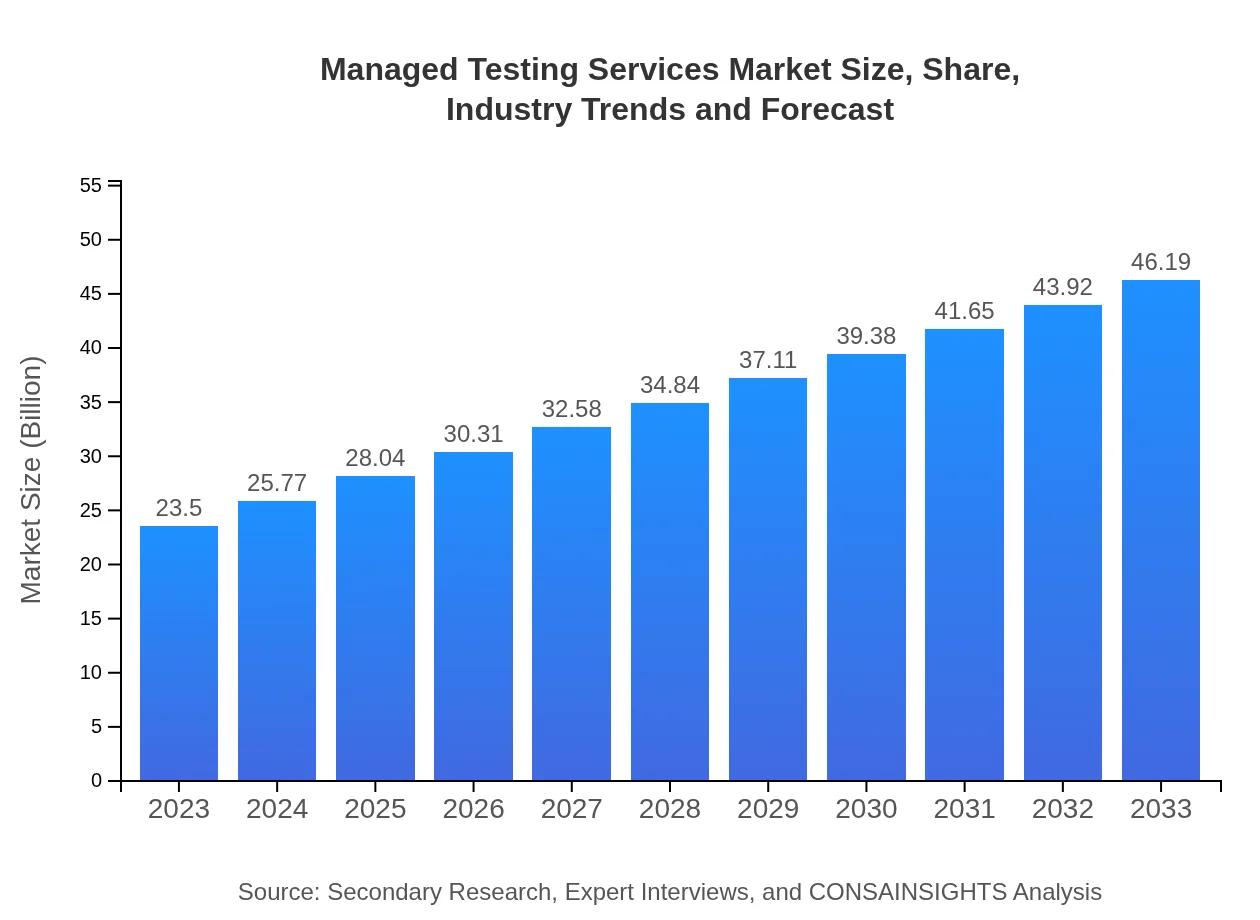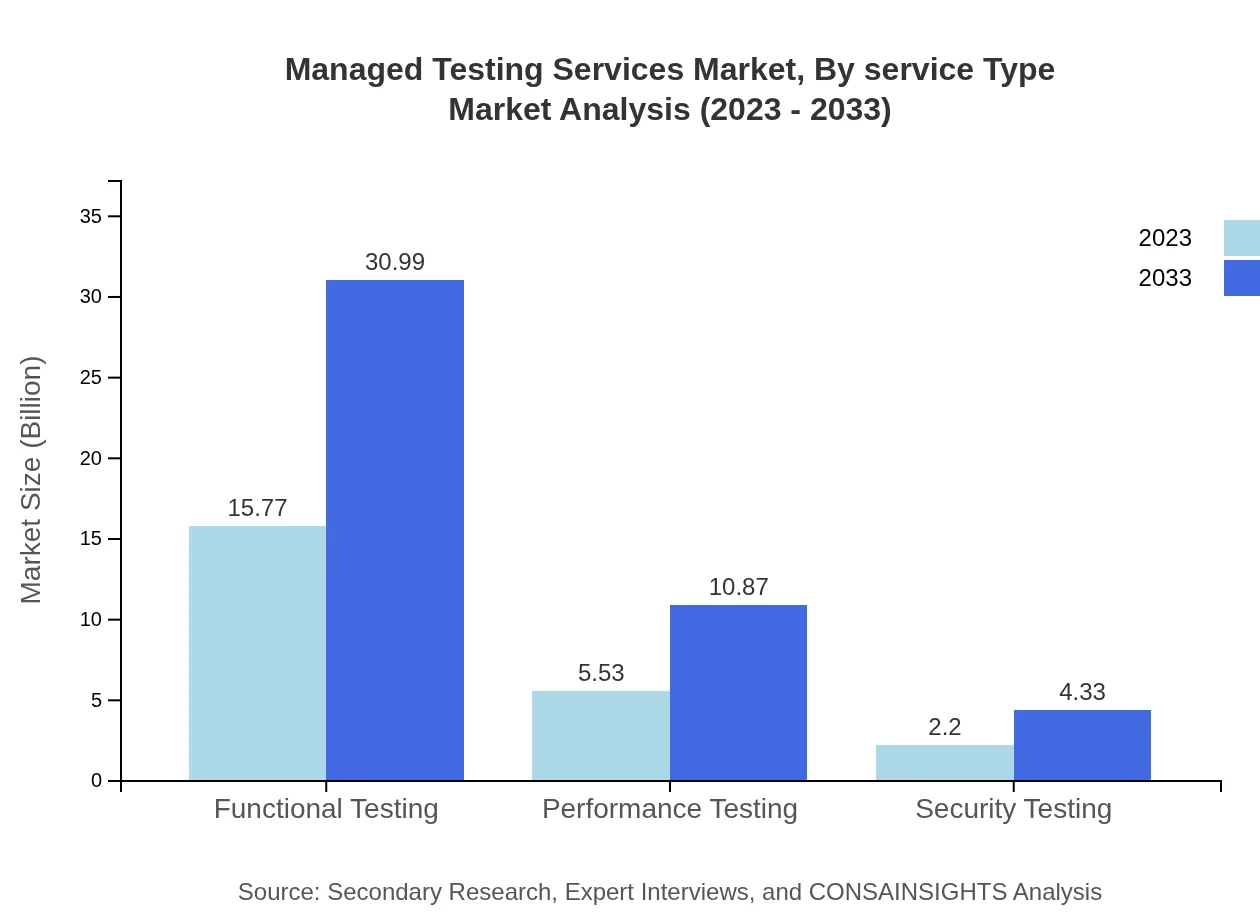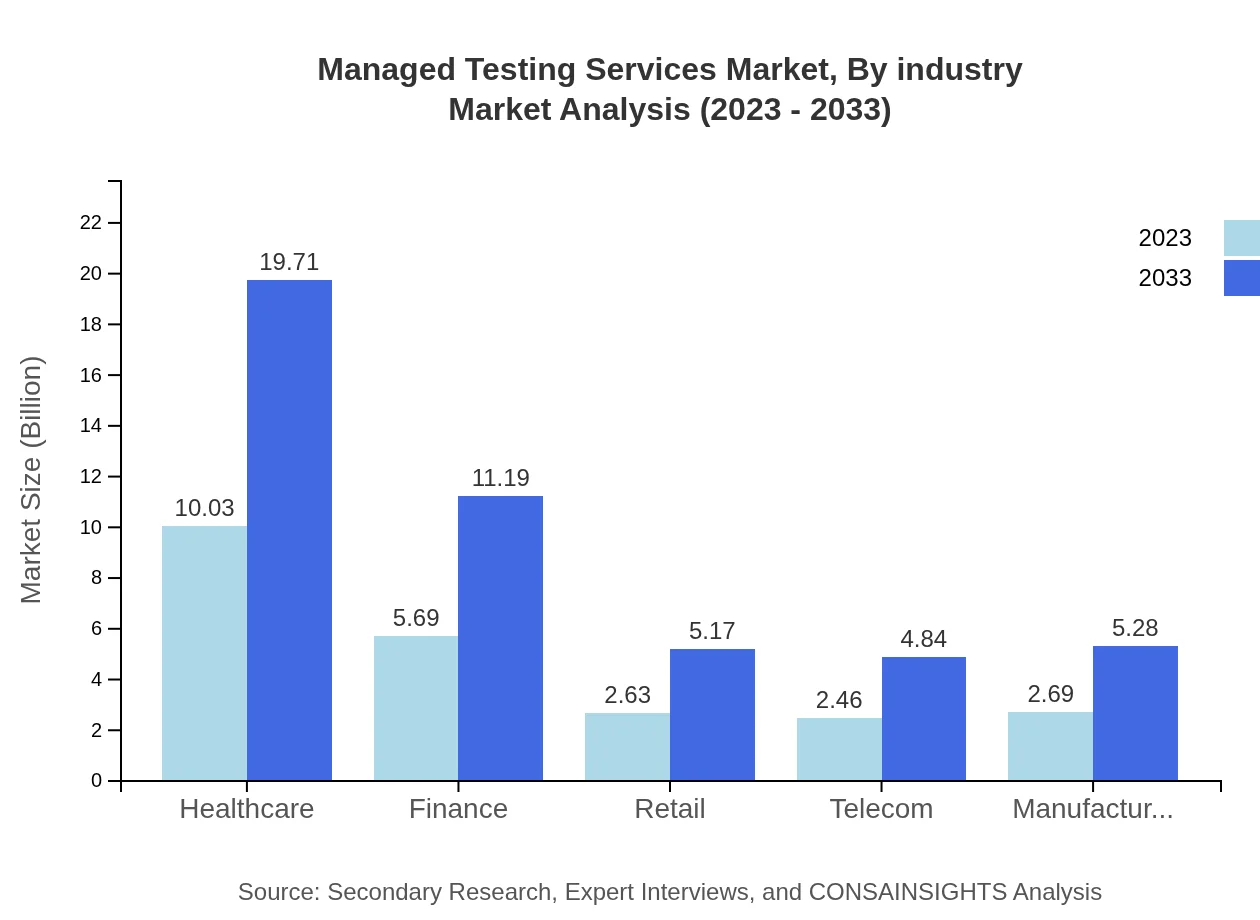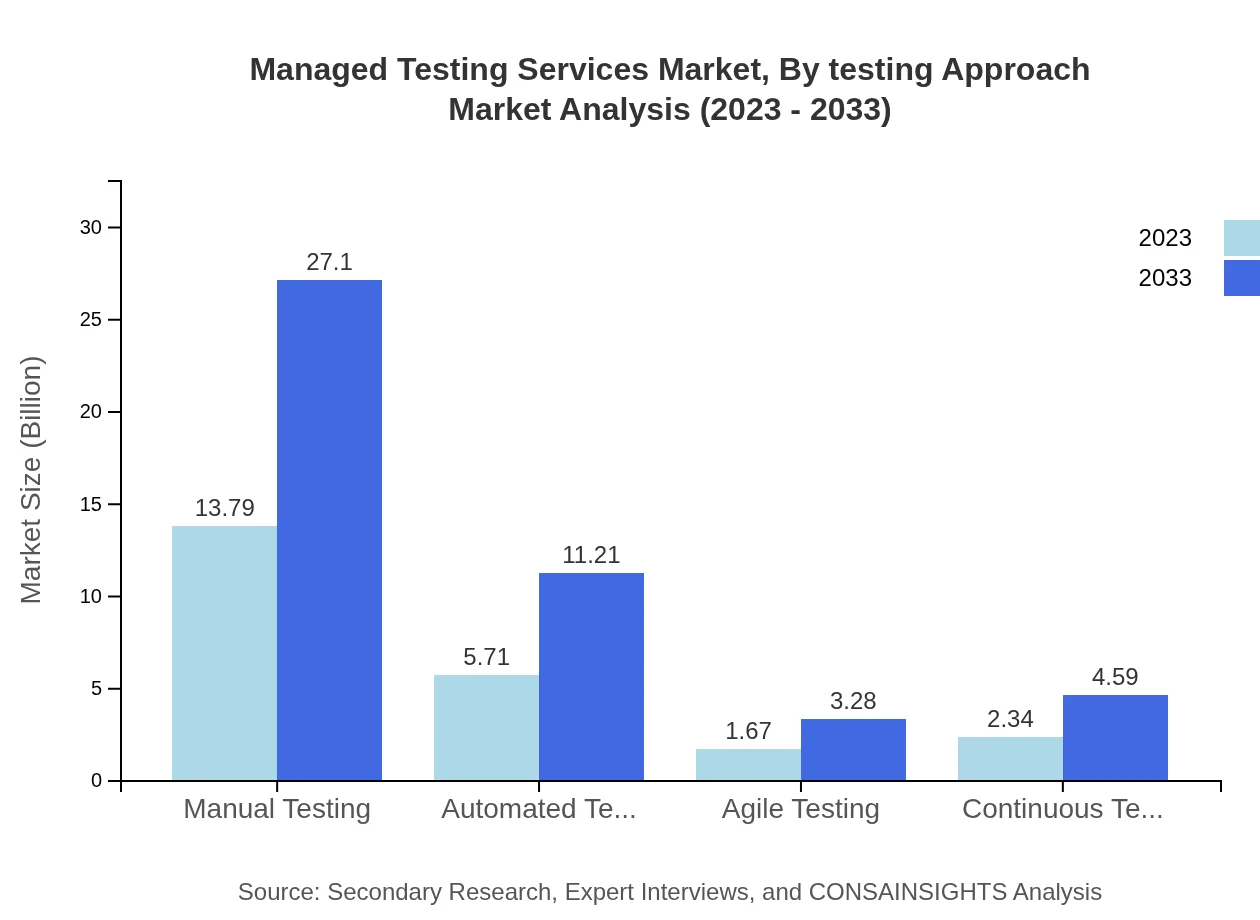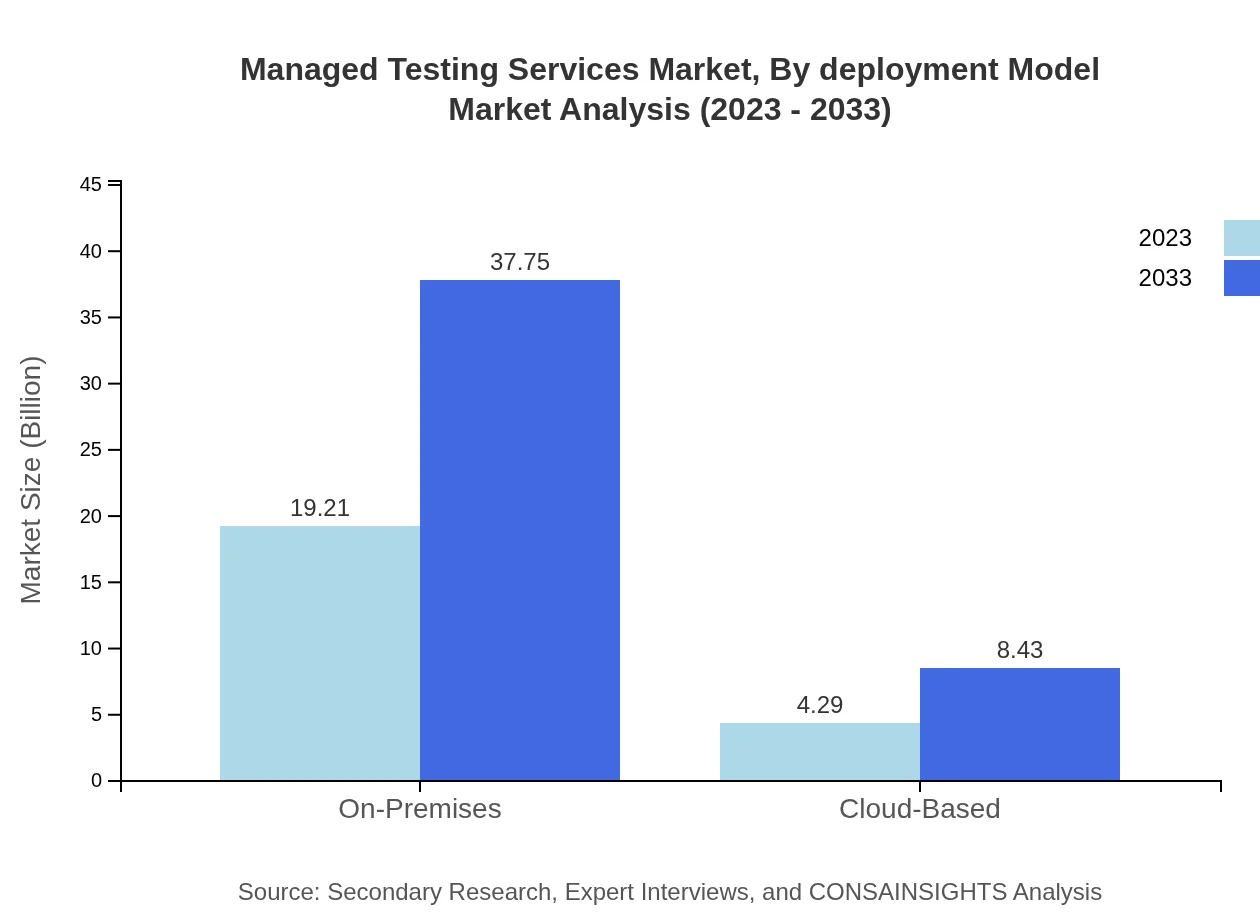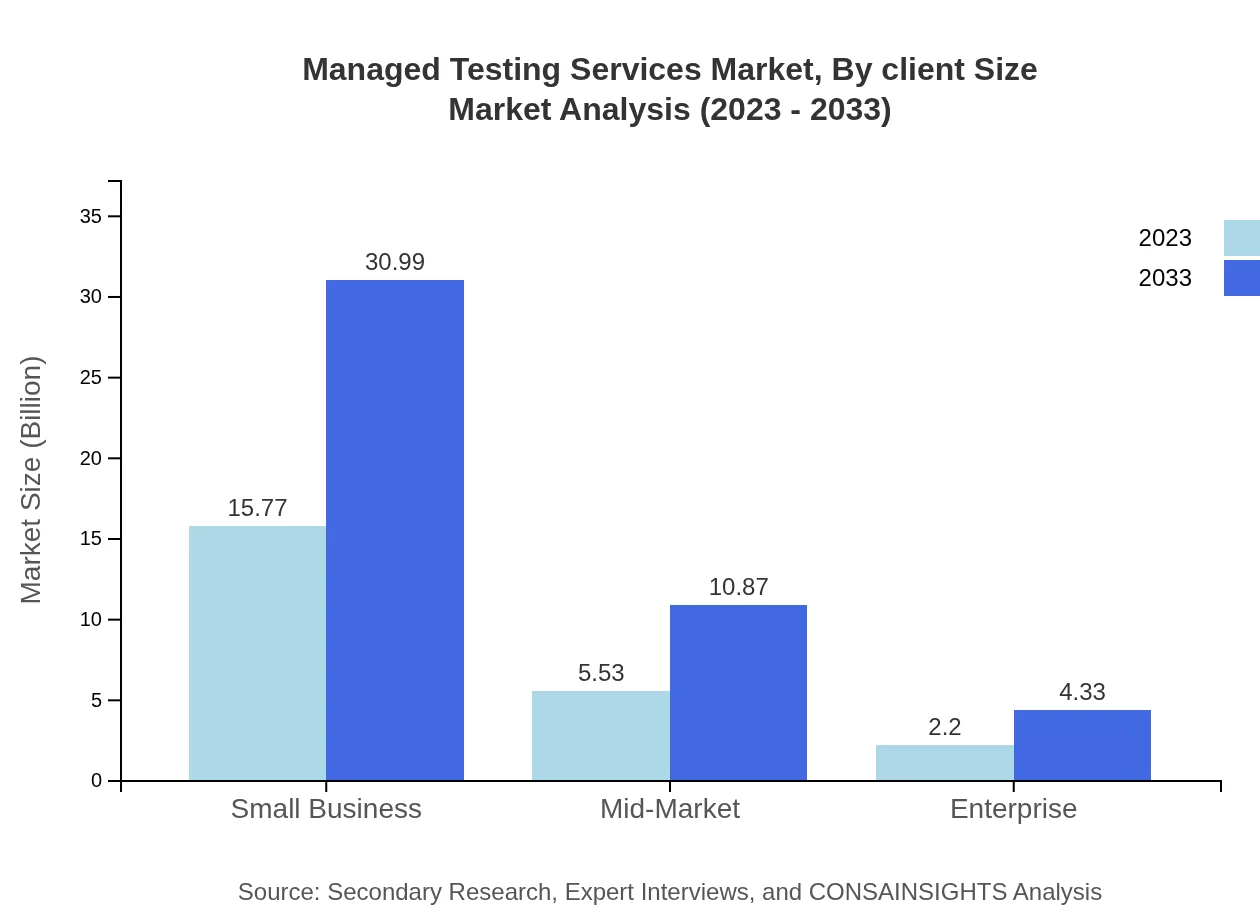Managed Testing Services Market Report
Published Date: 31 January 2026 | Report Code: managed-testing-services
Managed Testing Services Market Size, Share, Industry Trends and Forecast to 2033
This report provides an in-depth analysis of the Managed Testing Services market, highlighting key trends, growth projections, and competitive landscape insights from 2023 to 2033.
| Metric | Value |
|---|---|
| Study Period | 2023 - 2033 |
| 2023 Market Size | $23.50 Billion |
| CAGR (2023-2033) | 6.8% |
| 2033 Market Size | $46.19 Billion |
| Top Companies | Accenture, Capgemini, Cognizant, Tata Consultancy Services (TCS) |
| Last Modified Date | 31 January 2026 |
Managed Testing Services Market Overview
Customize Managed Testing Services Market Report market research report
- ✔ Get in-depth analysis of Managed Testing Services market size, growth, and forecasts.
- ✔ Understand Managed Testing Services's regional dynamics and industry-specific trends.
- ✔ Identify potential applications, end-user demand, and growth segments in Managed Testing Services
What is the Market Size & CAGR of Managed Testing Services market in 2033?
Managed Testing Services Industry Analysis
Managed Testing Services Market Segmentation and Scope
Tell us your focus area and get a customized research report.
Managed Testing Services Market Analysis Report by Region
Europe Managed Testing Services Market Report:
The European Managed Testing Services market is anticipated to grow from USD 6.74 billion in 2023 to USD 13.24 billion by 2033. The region's focus on innovation, regulatory compliance, and a well-established IT infrastructure promotes a thriving MTS landscape.Asia Pacific Managed Testing Services Market Report:
In the Asia Pacific region, the Managed Testing Services market is expected to grow from USD 4.45 billion in 2023 to USD 8.74 billion by 2033. The key drivers include the rapid adoption of digital technologies, increasing investments in IT infrastructure, and a growing emphasis on quality assurance in software deployment.North America Managed Testing Services Market Report:
North America leads the market with a size of USD 8.82 billion in 2023, expected to reach USD 17.34 billion by 2033. The presence of key players, high investment in advanced testing technologies, and stringent compliance regulations in sectors like finance and healthcare are significant contributors to this growth.South America Managed Testing Services Market Report:
The South American Managed Testing Services market is projected to grow from USD 1.64 billion in 2023 to USD 3.22 billion by 2033. Factors contributing to this growth include heightened awareness regarding software quality among businesses and increasing demand for digital transformation across various sectors.Middle East & Africa Managed Testing Services Market Report:
The Middle East and Africa region is expected to see growth from USD 1.85 billion in 2023 to USD 3.64 billion by 2033, driven by digital transformation initiatives and increasing demand for quality software across emerging markets.Tell us your focus area and get a customized research report.
Managed Testing Services Market Analysis By Service Type
The market segments by service type reflect varied growth rates. Functional Testing dominates the segment with an anticipated growth from USD 15.77 billion in 2023 to USD 30.99 billion by 2033. Performance Testing follows with USD 5.53 billion projected to grow to USD 10.87 billion, while Security Testing is expected to double from USD 2.20 billion to USD 4.33 billion over the same period.
Managed Testing Services Market Analysis By Industry
The industry segmentation indicates that Healthcare constitutes a significant portion of the market, with size expected to rise from USD 10.03 billion in 2023 to approximately USD 19.71 billion by 2033. Other notable segments include Finance and Retail, which are also on a growth trajectory due to the necessary compliance with quality standards.
Managed Testing Services Market Analysis By Testing Approach
The approach to testing reveals a split between Manual and Automated Testing, with Manual Testing expected to remain dominant. With a share of 58.68% in 2023, it's projected to grow to 63% by 2033. On the other hand, Automated Testing is gaining traction, moving from USD 5.71 billion to USD 11.21 billion, emphasizing the need for faster testing cycles.
Managed Testing Services Market Analysis By Deployment Model
In terms of deployment models, the On-Premises segment is still leading, projected to increase from USD 19.21 billion to USD 37.75 billion. However, Cloud-Based solutions are gaining popularity, doubling from USD 4.29 billion to USD 8.43 billion as organizations lean towards flexible and scalable solutions.
Managed Testing Services Market Analysis By Client Size
The market indicates distinct trends by client size, with Small Businesses commanding the largest share at 67.1%. This segment is projected to grow from USD 15.77 billion to USD 30.99 billion. Mid-Market and Enterprise clients also present growth opportunities, though at a comparatively slower pace.
Managed Testing Services Market Trends and Future Forecast
Tell us your focus area and get a customized research report.
Global Market Leaders and Top Companies in Managed Testing Services Industry
Accenture:
Accenture is a global leader in consulting and technology services, providing comprehensive testing solutions that leverage automation and analytics.Capgemini:
Capgemini offers end-to-end testing services focusing on innovation and operational excellence, with a strong presence in multiple industries.Cognizant:
Cognizant specializes in IT services and solutions, providing advanced managed testing services that enhance software quality and reduce risk.Tata Consultancy Services (TCS):
TCS is a prominent global IT services provider, offering diverse testing services through its robust testing frameworks and methodologies.We're grateful to work with incredible clients.









FAQs
What is the market size of managed Testing Services?
The global managed testing services market is currently valued at approximately $23.5 billion, with a projected Compound Annual Growth Rate (CAGR) of 6.8% over the next decade, indicating significant growth opportunities within this sector.
What are the key market players or companies in this managed Testing Services industry?
Major companies in the managed testing services sector include industry leaders like Accenture, Infosys, Capgemini, TCS, and IBM. These organizations are recognized for their extensive experience and innovative solutions in providing comprehensive testing services.
What are the primary factors driving the growth in the managed testing services industry?
Key factors propelling growth include rising demand for automation, increasing software complexity, a focus on improving product quality, and the necessity for cost-efficiency, compelling organizations to outsource testing services to specialized providers.
Which region is the fastest Growing in the managed Testing Services?
North America is identified as the fastest-growing region in managed testing services, with growth anticipated from $8.82 billion in 2023 to $17.34 billion by 2033, driven by technological advancements and robust IT investments.
Does ConsaInsights provide customized market report data for the managed Testing Services industry?
Yes, ConsaInsights offers tailored market reports for the managed testing services industry, enabling businesses to receive insights specific to their needs, market segments, or geographical regions, ensuring relevant and actionable data.
What deliverables can I expect from this managed Testing Services market research project?
Deliverables from the managed testing services market research project typically include comprehensive reports, graphical data representations, SWOT analysis, competitive landscapes, and actionable insights that support strategic decision-making.
What are the market trends of managed Testing Services?
Current trends in managed testing services include a shift towards cloud-based solutions, increased adoption of automation tools, a growing emphasis on security testing, and the integration of artificial intelligence to enhance testing efficiency and accuracy.

